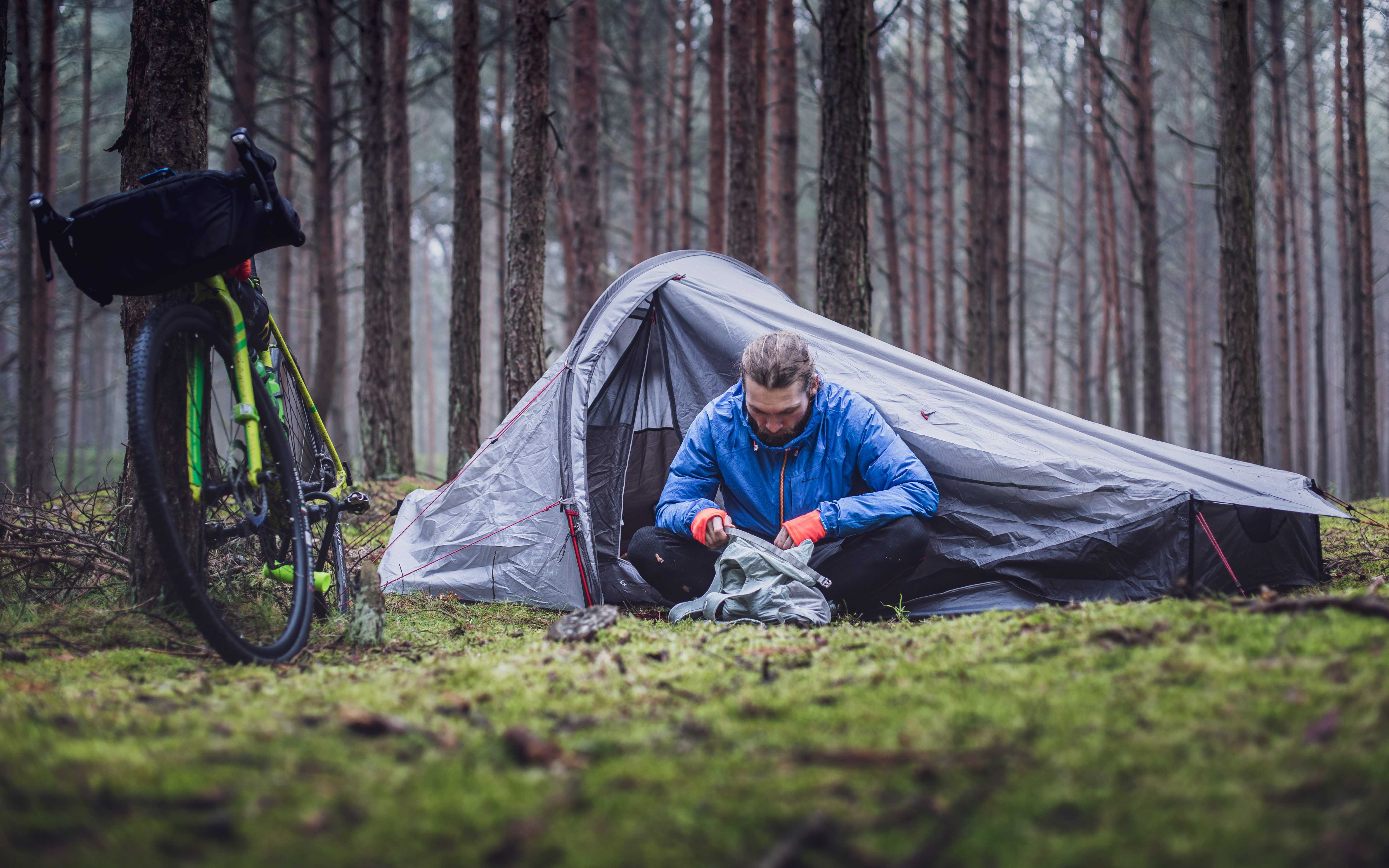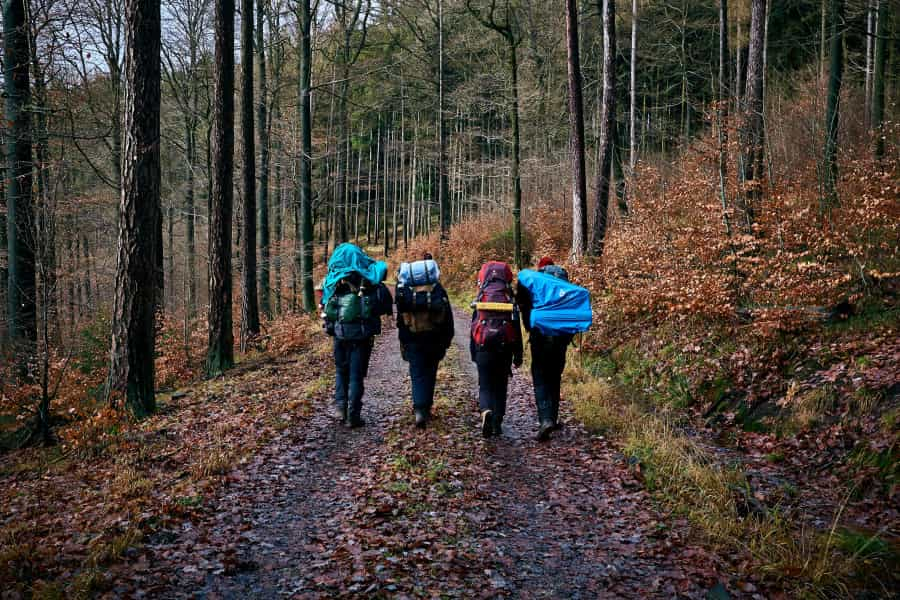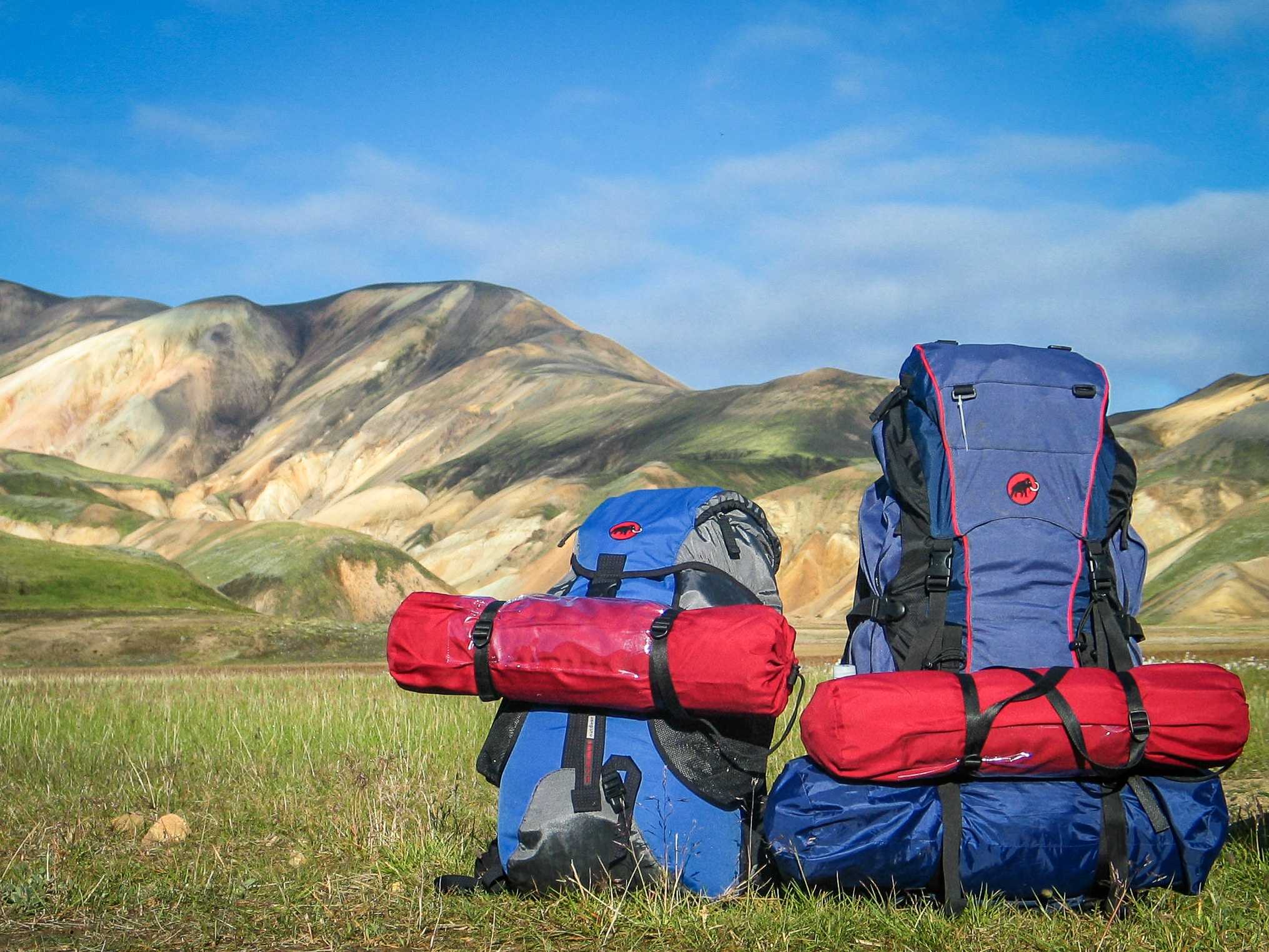How to go camping without a car
Not everybody drives or wants to travel by car when going away on holiday. There are many reasons for this, with running costs and environmental concerns being the main reasons people are swerving road travel, but that doesn’t mean that camping is off limits. It’s perfectly possible to go camping without a car as long as you plan ahead with your choice of campsite, your packing and your travel options.
This Pitchup guide looks at how to organise camping breaks without a car, how to pick a site and plan your journey – and gives tips on how to get the most out of your no-car camping trip, whether you’re travelling alone or bringing the whole family along.

Why go camping without a car?
Going on a camping holiday without a car means you’ll have to organise the logistics of getting to the site and back home again, but it will free you up to enjoy your holiday without the stress of driving, and get you out into the open to appreciate your surroundings. Other advantages include:
-
You won’t need to worry about petrol expenses or parking charges.
-
If you’re heading off on a linear, long-distance backpacking and camping break – for example on the Great Glen Way – it is a definite advantage to travel without a car, as you won’t have to return to the beginning of the walk to pick it up.
-
Likewise if you are backpacking and wild camping deep in remote countryside, you won’t need to worry about leaving your car somewhere secure.
How to pack for a no-car camping trip
When you’re not not driving to your campsite, you’ll need to travel light. The fewer pieces of luggage you carry, the more enjoyable your journey and camping adventure will be. If you’re travelling solo, try to limit yourself to a tent, sleeping bag and mat in a lightweight rucksack, plus basic cooking, eating and drinking utensils. As far as clothes are concerned, pack a few layers and a waterproof jacket; most campsites have laundry facilities so you can wash clothes if necessary. Of course, you’ll need much more kit for a fortnight’s family camping holiday, but the general rule of thumb is to keep it all as light as possible.
Pitchup’s packing checklist is a good place to start for any camping trip, but if you’re not taking a car, try and reduce the list as much as is humanly possible. Prioritise versatile items that pack down well, favouring quick-drying clothes as you’ll be using on-site laundry facilities.
If you’re travelling with a partner or friend, spread the load between you, and check that you’ve got all the necessary kit without doubling up on anything. Don’t forget that most kids can manage to carry a few of their own clothes and perhaps a toy or two, either in a small backpack or bike panniers if you’re cycling.
Top tip: Pitchup has 15 handy hints for keeping costs down on a camping holiday.
Where can you go camping without a car?
The short answer is that with enough forward planning and flexibility, you can go camping without a car almost anywhere you choose. Online research can help pinpoint accessible locations; national park websites, for example, often have information about public-transport services and cycle trails. Otherwise, the filters on the Pitchup booking page can help you tailor your booking to find a suitable car-free base.
Eight ways Pitchup can help
Choosing your campsite when you’re camping without a car boils down to two main criteria: location and facilities. Pitchup’s detailed listings and handy tick box filters can help you find campsites that fit the bill on both fronts.
-
Pitchup’s ‘public transport nearby’ tick box (nested under ‘Nearby amenities’) is a handy tool to help you find suitable sites. Combine that with the ‘leave the car at home’ filter (under Themes) for no-car camping.
-
If your chosen campsite isn’t listed under the ‘leave the car at home’ filter, click the ‘Location’ tab below the pictures on its listing page, and under the map you’ll see details of all public transport nearby, including coach and bus stations, train stations, ferry terminals and airports.
-
If you click the ‘Directions’ button to the right of the map under the ‘Location’ tab, you can add your postcode on Google Maps and get directions – whether by public transport, bike or on foot – to your chosen site.
-
On the search bar, look for sites with rental accommodation such as camping and glamping pods,static caravans, lodges and log cabins, or consider renting a tent so you don’t have to carry too much gear.
-
If you’re going no-car camping to get off the beaten track, look for campsites in a remote location, listed as ‘peaceful’ or ‘in a wildlife haven’ on the filters.
-
You’ll need to travel light, so use the filters to search for campsites according to their on-site utilities, amenities and leisure: for example, sites with gas cylinders for sale, ice-pack freezing, a launderette, a bar, café, restaurant or takeaway on site – – these will cut down on the clothes and cooking utensils you’ll need to pack.
-
If you’re travelling with kids, look at hiring a tent on family-friendly campsites with play areas or books and games to hire so you don’t have to take your own.
-
Look for sites with bike hire available so you can explore the area without bringing cycles.

10 ways to get to your site without a car
There are plenty of ways to get to your campsite or caravan park without driving – read on for Pitchup’s 10 handy suggestions.
-
Plan your itinerary around public transport. Do any trains or buses go directly to (or close to) your favoured campsite?
-
Choose a location that’s close to a railway station – for example, head towards Horton-in-Ribblesdale for a Yorkshire Dales break, Dawlish for the Devon seaside or Rhosneigr for Anglesey camping.
-
Research the bus network in your chosen area and find a service that runs from a major town to a stop near the campsite.
-
Get a taxi to your site from a nearby town if it’s not too far – although this is an expensive option, and you may have to book ahead.
-
Walk to the site from a bus or railway terminal.
-
Some site owners pick guests up from stations or bus stops – to find these, just check the ‘pick up from public transport’ tick box under ‘Amenities on site’ on the Pitchup filters page.
-
Site owners near major walking routes often have a pick-up service running between the hiking trail and the site.
-
Cycle to your destination, splitting your kit between your backpack and panniers.
-
Plan a multi-day hike along a long-distance path like the South Downs Way and walk from campsite to campsite.
Use ride-sharing apps like BlaBlaCar or Liftshare to find people heading in your direction and share a lift.

UK campsites near train stations
If you’re planning a camping trip without a car, an obvious way to make travel easy is to find a campsite near a railway station. The UK’s rail network stretches into all sorts of scenic areas, coastal towns and national parks so there are plenty of options – simply use the Pitchup map function to find sites near your chosen station, or check individual campsite listings for details of the nearest station.
Five campsites for car-free camping in the UK
We’ve picked out five top UK campsites that are within a mile of a railway station and particularly well set up for camping breaks without a car.
Thames View Camping, Essex
Looking for an easy escape to the east of London? Take the hour-long train ride to East Tilbury and pitch up at Thames View Camping, where spacious pitches overlook the riverside. It’s a 15-minute walk from the station to the site and there’s a pub 10 minutes’ walk away, although an on-site honesty shop takes care of everything you need for an evening by the campfire.
The Barn Caravan Park, West Sussex
About 10 minutes’ walk from Lancing railway station – from where you can catch a train to Brighton for the day – The Barn Caravan Park is a well-equipped campsite 10 minutes’ walk from Lancing beach. Facilities include lots of games and a play area for the kids, a snack bar selling drinks and ice creams and a supermarket just outside the station.
Whitemead Caravan Park, Dorset
It’s a mere five minutes to walk to Whitemead Caravan Park from Wool station – and this village location is also handy for shops, pubs and fish and chip suppers. Bus services run from the village to Weymouth, Dorchester and Lulworth Cove, or you can walk to Monkey World or The Tank Museum in Bovington in about half an hour.
Hendre Hall Holiday Park, North Wales
A seaside Snowdonia spot might seem out of reach without a car – but Hendre Hall Holiday Park is only five minutes’ walk from Llwyngwril station, its pub, shop and beach. Coastal path walks are popular activities here, or you can get back on the train for trips to Harlech Castle and seaside towns like Aberdovey or Pwllheli.
Drummohr Camping and Glamping Site, East Lothian
Stay at Drummohr Camping and Glamping Site, on the edge of Prestonpans, and the seafront and nature reserves are a few minutes’ walk away, and Wallyford station is 20 minutes’ stroll for trips into Edinburgh. Facilities at this well-equipped site include a licensed shop, campers’ kitchen and a playground for the kids.
Ready to go camping without a car? Take a look at our full list of campsites around the country to find something suitable for your needs.
Browse all of Pitchup’s UK campsites
Camping in Europe without a car
Car-free camping isn’t limited to the UK, of course – Europe has many opportunities too. Once you’ve mastered packing lightly, travelling without a car is very liberating, giving you the option to take high-speed trains or cheap coach services to free you from the stress of driving in unfamiliar territory.
Such trips take planning, however. Some European countries are easier to navigate than others – The Netherlands, for example, is bike-friendly with lots of campsites catering for walking and cycling holidays. Germany, Austria and Spain have excellent public-transport systems, while Luxembourg and Malta top the charts as public transport is free in both countries to encourage people to ditch their cars.
At the other end of the spectrum, camping without a car is more challenging in Bulgaria, Greece and Croatia, which came bottom of the list on a recent Greenpeace ranking of European public-transport systems.
For an overview of how to get around Europe by public transport, use websites such as Rome2Rio or the app Omio, which show options for train, ferry and bus travel. The Man in Seat 61 has some great guides to train travel on the continent, and Mpact is a useful source of eco-friendly carpool rides.
There are many campsites in Europe that are well set up for camping without a car. Family campsites in France, Italy and Spain in particular often have fantastic facilities including restaurants, shops, swimming pools and kids’ clubs, so you can keep the packing light and spend more time on site rather than organising lots of outings.
Five campsites for car-free camping in Europe
Need inspiration? Have a look at five popular sites where you can camp without a car in Europe.
Camping Paris Est, France
This riverside spot has a budget-friendly bus stop right outside for services taking you to the city in about 20 minutes. There’s a restaurant on site so you won’t have to bring your own food, and you can pick up supplies in the shop if you’re going self catering.
Vakantiepark Delftse Hout, Netherlands
This site on the edge of Delft has easy access to the city centre by public transport, on foot or via cycle paths. Bike paths also take you along the canal to The Hague. Handy on-site facilities include a restaurant, pool and launderette.
Camping Santa Elena Ciutat, Spain
Once you’re in this Lloret de Mar beach resort on the Costa Brava, you’ll find most things you need within walking or cycling distance, including shops and restaurants. If you’re holidaying with kids, there are several amusement, theme and water parks within walking distance.
Camping Rialto, Italy
Camping Rialto is only 15 minutes’ bus ride away from Venice, with a bus stop just outside the site, so you can dip in and out of the city and its islands whenever you like. Dinners, drinks and breakfasts can all be bought on site and there’s a pool for some relaxed downtime.
Parque Orbitur Guincho, Portugal
Bus services from Lisbon to Parque Orbitur Guincho take about 90 minutes, but once you’re ensconced on this family site, you have a tennis court, swimming pool, games room, bar-restaurant and food shop at your disposal. Praia da Guincho beach is about five minutes’ walk away too.
Wherever you're going in the world, there are plenty of options around for camping without a car, and planning ahead can really make your experience as smooth and comfortable as possible. Whether you're planning to travel by bike, get around on foot or use public transport, using Pitchup's filters will help you to find the ideal site for your no-car camping break.
Explore all of Pitchup's campsites